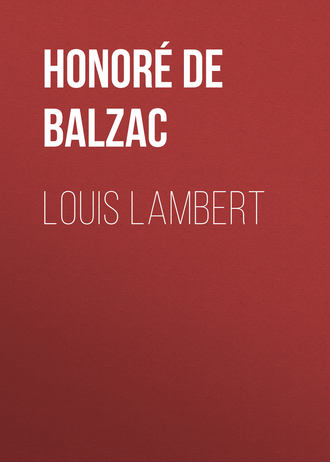
Оноре де Бальзак
Louis Lambert
The sight of Louis had had some mysteriously sinister influence over me. I was afraid to place myself again in that heavy atmosphere, where ecstasy was contagious. Any man would have felt, as I did, a longing to throw himself into the infinite, just as one soldier after another killed himself in a certain sentry box where one had committed suicide in the camp at Boulogne. It is a known fact that Napoleon was obliged to have the hut burned which had harbored an idea that had become a mortal infection.
Louis' room had perhaps the same fatal effect as that sentry box.
These two facts would then be additional evidence in favor of his theory of the transfusion of Will. I was conscious of strange disturbances, transcending the most fantastic results of taking tea, coffee, or opium, of dreams or of fever – mysterious agents, whose terrible action often sets our brains on fire.
I ought perhaps to have made a separate book of these fragments of thought, intelligible only to certain spirits who have been accustomed to lean over the edge of abysses in the hope of seeing to the bottom. The life of that mighty brain, which split up on every side perhaps, like a too vast empire, would have been set forth in the narrative of this man's visions – a being incomplete for lack of force or of weakness; but I preferred to give an account of my own impressions rather than to compose a more or less poetical romance.
Louis Lambert died at the age of twenty-eight, September 25, 1824, in his true love's arms. He was buried by her desire in an island in the park at Villenoix. His tombstone is a plain stone cross, without name or date. Like a flower that has blossomed on the margin of a precipice, and drops into it, its colors and fragrance all unknown, it was fitting that he too should fall. Like many another misprized soul, he had often yearned to dive haughtily into the void, and abandon there the secrets of his own life.
Mademoiselle de Villenoix would, however, have been quite justified in recording his name on that cross with her own. Since her partner's death, reunion has been her constant, hourly hope. But the vanities of woe are foreign to faithful souls.
Villenoix is falling into ruin. She no longer resides there; to the end, no doubt, that she may the better picture herself there as she used to be. She had said long ago:
"His heart was mine; his genius is with God."
CHATEAU DE SACHE. June-July 1832.
ADDENDUM
The following personages appear in other stories of the Human Comedy
Lambert, Louis
A Distinguished Provincial at Paris
A Seaside Tragedy
Lefebvre
A Seaside Tragedy
Meyraux
A Distinguished Provincial at Paris
Stael-Holstein (Anne-Louise-Germaine Necker, Baronne de)
The Chouans
Letters of Two Brides
Villenoix, Pauline Salomon de
A Seaside Tragedy
The Vicar of Tours


